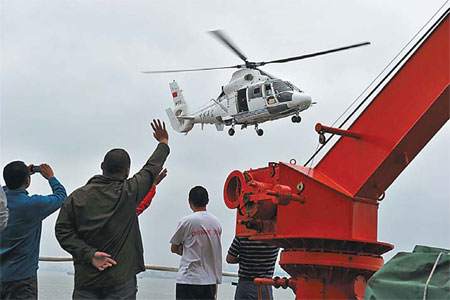Pilot meets challenge of Antarctic rescue
|
A China Coast Guard helicopter passes by crew members aboard Xuelong on Sunday. The icebreaker stopped at the Yangtze River estuary for processing on Monday and docked in Shanghai on Tuesday. Zhang Jiansong / Xinhua News Agency |
On Jan 2, Jia Shuliang, one of China's most experienced helicopter pilots, lifted off in a Kamov Ka-32 from Xuelong, a Chinese icebreaker, in Antarctica to rescue 52 passengers aboard a stranded Russian research vessel that had been trapped since Christmas Eve.
It was a good day to fly - clear skies, warm temperatures, about 2 C - and the 56-year-old pilot and his partner, Liang Gaosheng, headed to the Akademik Shokalskiy, the trapped ship, about 12 km from Xuelong, or Snow Dragon, at about noon. The helicopter had wooden planks and 10 staff on board.
Despite strong winds, Jia, who has been flying helicopter missions for 38 years, calmly piloted the helicopter, knowing one wrong move could mean the difference between life and death. The landing area was an ice sheet about 100 meters long and 80 meters wide to the right of the Russian ship.
"The first flight was the most important and the most challenging because the helicopter needed to hover over the ice without moving," Jia said.
Helicopter snow landings are usually dangerous because the rotor downwash can cause whiteout conditions, a big safety threat. Jia and his crew got the idea to lay planks on the ice to avoid the loss of visibility from blowing snow.
But Jia was also facing another hazard - hovering over the frozen sea.
Jia cannot remember how long it took to lay the planks, but he knew they were the longest hours of his life.
"I just keep one thing in mind - that the hovering helicopter cannot move, because one slight lurch can threaten lives of the people on the ice," Jia said.
After the challenging first flight, Jia and Liang needed five more to rescue all 52 stranded passengers and their luggage. The rescue lasted from 12 pm to 10 pm on Jan 2.
"I wasn't hungry or tired when I saw the smiles on the people who got rescued," Jia said with a smile, adding that he was quite proud of the mission.
The mission was just a small part of Jia's job during the 159-day Antarctic expedition. In addition to the rescue, Jia and his team flew for more than 120 hours to deliver more than 1,000 metric tons of construction material and supplies to Taishan, China's fourth Antarctic research base, and supplementation for the Zhongshan station.
To rescue the Russian ship and search for the Malaysia Airlines' missing flight, Xuelong passed the westerlies six times, which made Jia's life on board a nightmare. Westerlies bring cyclones, causing strong currents in the ocean.
"It is my first time to cross the westerlies and I felt shaky, had blurred vision and was uncomfortable overall," Jia said, adding that he was seasick the whole time.
wangqian@chinadaily.com.cn



















